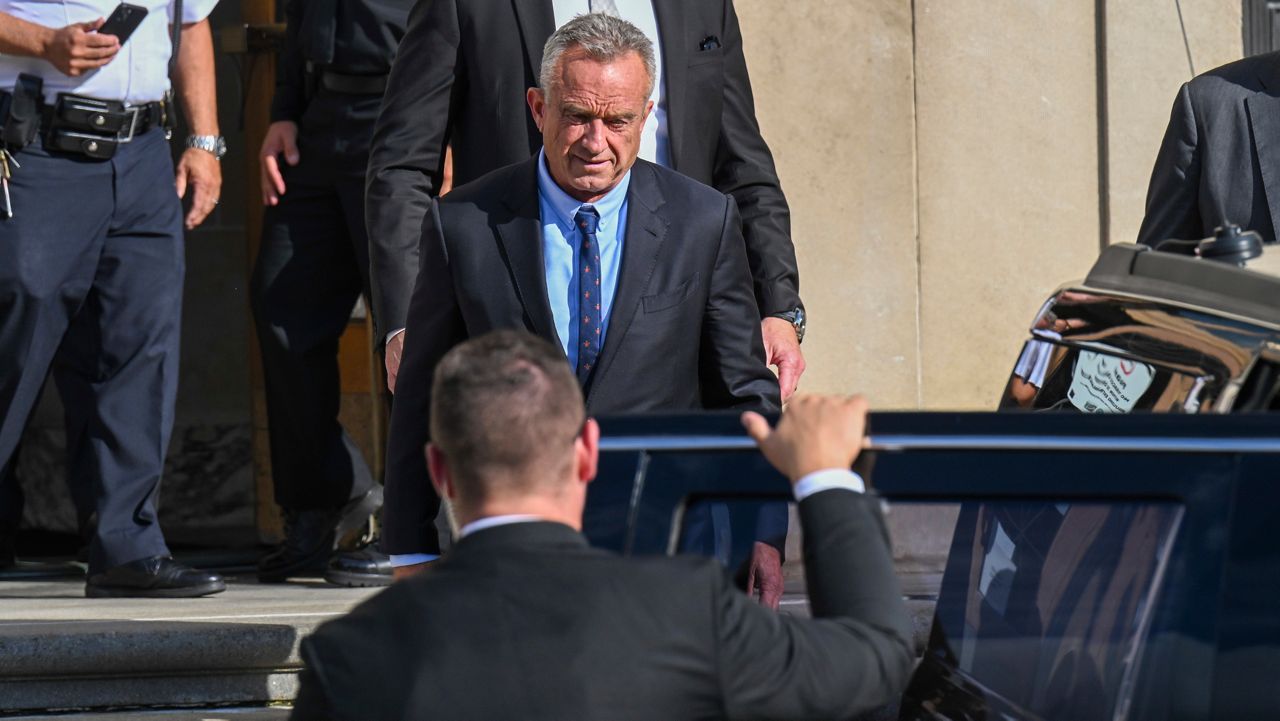Independent presidential candidate Robert F. Kennedy Jr. will speak Friday "about the present historical moment and his path forward," his campaign announced Wednesday, fueling growing speculation that Kennedy could drop out and support Republican nominee Donald Trump.
Kennedy's running mate openly discussed the possibility on a podcast this week, saying the campaign was considering a move to “join forces” with Trump to limit the election chance of Kamala Harris, whose Democratic convention winds up Thursday night in Chicago.
What You Need To Know
- Independent presidential candidate Robert F. Kennedy Jr. will speak Friday “about the present historical moment and his path forward"
- His campaign announced the speech on Wednesday, fueling growing speculation that Kennedy could drop out and support Republican presidential nominee Donald Trump
- Kennedy’s running mate openly discussed the possibility on a podcast this week
- Nicole Shanahan said the campaign was considering a move to “join forces” with Trump to limit the possibility of Democratic Vice President Kamala Harris winning the election
- Kennedy is a member of a beloved Democratic dynasty, the nephew of President John F. Kennedy and son of Robert Kennedy
The move would have once seemed unthinkable for Kennedy, a Democrat for most of his life and — as the nephew of President John F. Kennedy and the son of Robert F. Kennedy — a member of a beloved Democratic dynasty.
Last month, during the Republican National Convention, Kennedy's son posted and then quickly deleted a video showing a phone call between Kennedy and Trump, in which the former president appeared to try to talk Kennedy into siding with him.
Kennedy will give a speech in Phoenix, hours before Trump is scheduled to hold a rally in neighboring Glendale. A spokesperson for Kennedy, Stefanie Spear, declined to say whether he planned to drop out or why he chose Arizona for his speech.
Trump and Kennedy have been in regular contact in recent weeks, including a meeting in Milwaukee as Republicans gathered for their national convention last month.
He told CNN Tuesday that he would "love" an endorsement from the independent candidate, whom he called a "brilliant guy."
He also said he would "certainly" be open to Kennedy playing a role in his administration if Kennedy drops out and endorses him instead.
"He's a very smart guy. I've known him for a very long time," Trump told the network. "I didn't know he was thinking about getting out, but if he is thinking about getting out, certainly I'd be open to it."
Trump, who had previously railed against Kennedy as "the most radical left candidate in the race," was also asked by CNN If he would consider appointing Kennedy to a role in his administration if he wins in November,
"I like him a lot. I respect him a lot," Trump said. "I probably would, if something like that would happen. He's a very different kind of a guy — a very smart guy. And, yeah, I would be honored by that endorsement, certainly."
After leaving the Democratic primary to run as an independent, Kennedy built an unusually strong base of support for someone running without the backing of a major party. It was unclear exactly where his support was coming from, which worried Republicans and Democrats alike.
But since President Joe Biden ended his re-election campaign and Democrats coalesced around Vice President Harris as their nominee, Kennedy's rise has been stunted. It looks increasingly unlikely that he will be able to make the debate stage when Trump and Harris face off next month, a moment Kennedy counted on for momentum and legitimacy. His campaign finances have also been strained.
The news comes a little over a week since a New York judge ruled that Kennedy should not appear on the ballot in the state because he listed a "sham" address on nominating petitions. Kennedy has appealed, but has faced several similar challenges around the country.
On Wednesday, he was in a courtroom in a suburb of New York City, testifying in a trial for another ballot suit in the state, this one backed by the Democratic National Committee, that challenges the signatures collected by his campaign.
During a break in the court proceedings, Kennedy declined to answer questions from reporters about whether he was dropping out.
He's also facing a likely legal challenge in Arizona, where last week he submitted signatures that may have been collected by a super PAC that supports him, which Kennedy's critics say is illegal coordination between a candidate and an independent political group.



